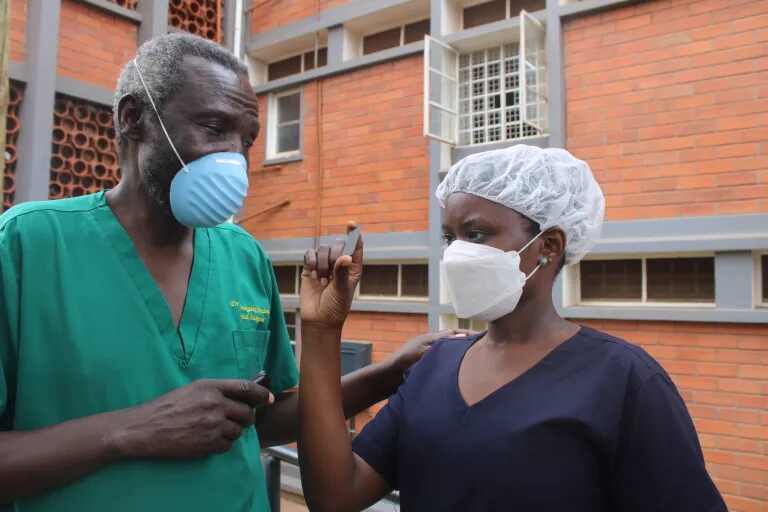By Patty Huston-Holm with Vanessa Kyalimpa
That ache in your tooth can cause a pain in your belly. To be more precise, oral bacteria weakens the stomach’s ability to fight infection and could result in inflammatory bowel disease. Vice versa, gastrointestinal issues can yield gum sores.
The human body is one package, according to Dr. Arabat Kasangaki, a dentist and lecturer with the Uganda Christian University (UCU) School of Dentistry. He explains this more than once each day to students and patients at the Mengo Hospital, Kampala, location. On this day, April 5, and seated at left with year-four student Diana Hilda Ayikoru and a male patient to his right, he reinforced the importance of using the proper words – explaining well and sensitively.

“If you only chew on one side of the mouth, chances are the food is not breaking down properly,” Arabat said in response to the male patient’s assertion that he has learned to live with discomfort. “It will not get better on its own.”
After an X-ray, it was determined the patient needed a root canal, a procedure where the infected pulp is removed to save the tooth.
Ayikoru, slated to finish UCU’s five-year dentistry program in 18 months, already knows that the teeth incisors and canines cut and tear food and that molars crush and grind. But as monotonous as that is for a dentist or dentistry student, the patient needs the education to understand, approve and trust.
“A good dentist serves and teaches to convince the patient to let us help do the right thing,” Arabat said. “The way God created us, we run when we feel pain.”
Uganda has 320 dentists licensed to practice in the country with more than 45 million residents, resulting in shortage that the Uganda Dental Association (UDA) attributes to limited training institutions. UCU is working to fill that gap – progress stymied with the Covid lockdown.
The UCU School of Dentistry has 29 students. The dentistry school has the same number of “pioneer” students – nine – it started with in 2018, but the later classes declined. The third-year class has seven. The second-year class numbers eight. Only five new students enrolled in the current, first year. For the first two years, much of the curriculum for School of Medicine and School of Dentistry is the same, with students in the same classes.
“Dentistry has always been less attractive in our country than medicine, even though the skill sets are much the same,” Arabat said. “Our numbers took a greater hit during the pandemic shift to no learning and then on-line learning that was new to most students and many faculty.”
Dr. John Magara, the SoM dean with a prestigious dentistry practice in Kampala, knows the global virus impact from the education, economic and service side of his profession.
“In normal times, wellness is difficult to reinforce here,” he said. “During the height of the pandemic when many were not earning money, it was even harder for us to send the message that regular dental checkups would help prevent emergencies like severe tooth pain from happening…and even harder to recruit students into a career where you are in close proximity to the disease-spreading mouth.”

Peter Kabuye, a pioneer student of UCU School of Dentistry that was launched in 2018, described the challenges faced during the two on-line semesters because of two Covid-related, government-ordered lockdowns.
“There are times when Moodle platform was unreliable, so we had to resort to platforms such as Zoom and Google Meets to have real time lectures,” he said. Additionally, not all resources on the UCU Moodle platform were free. For dental, as well as medical students, “we had to dig deeper into our pockets” to pay sh3,000 (85 cents) to sh5,000 ($1.40) each to access real-time lectures, he said.
Despite all the challenges, there was no option, but to persevere to reach his goal of being a dentist. Tuition from an American friend and the mentorship of both Dr. Ken Chapman, an American and Ugandan dentist who serves as a lecturer at the UCU school of dentistry and director at the Mengo Dental Clinic; and Dr. Martin Aliker, retired dentist, have sustained Peter.
“I’ve always wanted to be a dentist since I was very young,” he said. Since age four, his parents’ medical insurance privileges allowed him more than two dozen visits to a dentist to learn and reap rewards of good oral health.
Additionally, Peter’s family has high hopes for him after graduation in 2023. These expectations are premised on the fact that he was privileged to have attended good schools and is the first born of three siblings, leaving “no room for failure.”
Like most School of Dentistry and School of Medicine students and faculty, he returned in January to in-person training with Covid-19 vaccination status and wears a mask as usual. Patients do not have those requirements.
The return found equipment donations through Midmark and the Uganda Partners. These include sterilizers, a suction machine, compressors and work stations with chairs, as well as a simulated lab with computers.
In his early 60s and maneuvering around outside debris to share the location of the suction equipment in a room visible 30 feet from the patient treatment room, Arabat is on a mission to educate students to the greatest extent possible. Despite the Covid learning hurdles, Arabat is keenly aware, he says, that his work and his mission to play a role in yielding quality dentists are “directed by God” and that accomplishments are to His glory.


